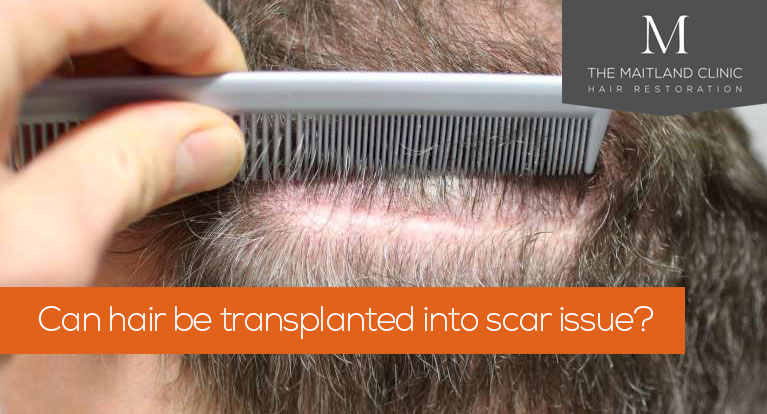Can you do a hair transplant on scar tissue?
8th January 2019

If you have scar tissue on your scalp – from an injury, a burn or even a previous hair transplant – you may be considering a hair transplant on scar tissue to help disguise it. Alternatively, you may wish to have a hair transplant and are worried that your scar tissue prevents you from benefitting.
If you have been searching questions like ‘can you do a hair transplant be done on scar tissue?’ on the web you may have been confused by apparently conflicting advice.
The answer is that hair transplants can indeed be performed over existing scar tissue – and there are many successful examples of this. However, extra care is required by the surgeon and multiple procedures may be required to achieve good results because scarred areas have a reduced blood supply.
How hair transplants work
There are two main kinds of hair transplant: Follicular Unit Excision (FUE – also known as Follicular Unit Extraction) and Follicular Unit Transplant (FUT). Both involve taking healthy hair follicles from a part of the scalp where hair is genetically programmed to keep growing for life (usually the back of the head) and transplanting them to the areas affected by hair loss.
The surgeon makes tiny incisions in the area of recipient area of the scalp, and then places the hair grafts from the donor area into these sites using very fine forceps or specialised implanter devices. The incisions determine the angle, direction and density of the transplanted hair, and to achieve a natural look the surgeon must pay extreme care and attention to the positioning and distribution of these follicular units, ensuring they blend seamlessly with the patient’s native hair.
Why scarred areas require special attention and multiple procedures
Hair grafts will grow in scar tissue, so it is perfectly possible to have a hair transplant performed over a scar.
If the tissue is thickened or raised local steroid injections may help to flatten it, but once the scar is smooth the transplant can be performed as normal.
However, areas of scar tissue can have a reduced level of blood supply compared to normal areas of the scalp. This means that the grafts should not be placed too close together, otherwise growth can be poor.
Instead, the surgeon will need to leave larger gaps than normal between grafts, and as these grow, new blood vessels will form in the area. The patient can then undergo further transplant procedures, adding extra grafts to achieve more density in these areas and a natural-looking final result.
At The Maitland Clinic we have a successful record of performing hair transplants on patients with scar tissue, often from previous procedures.
Transplants on scar tissue: aftercare
In the early days and weeks after a hair transplant is it very important to look after new hair grafts carefully. This is particularly the case in areas with scar tissue as there is an increased risk of the grafts being accidentally dislodged, particularly if you try to remove scabs too early, before they fall off.
It is vital not to touch the grafts for at least the first seven days after the procedure, and the grafts should be kept moisturised with dedicated aftercare sprays to optimise healing and growth.
Make sure your surgery provides a proper level of aftercare, particularly if you have scar tissue or burn tissue. At The Maitland Clinic we provide state-of the-art Liposomal ATP aftercare sprays as well as full instructions for washing your hair and taking any post-surgery medication.
Our patients can stay in regular contact with us in the months and years following their transplant, so we can monitor their progress and advise on caring for their hair and, if necessary, on further treatment.
What results can you expect if you have a hair transplant on existing scar tissue?
Although performing a hair transplant over existing scar tissue requires extra care and attention and may require several procedures rather than just one, the fundamental process is the same as any hair transplant.
Therefore you can expect to see good results so long as your surgeon is reputable and properly qualified.
At The Maitland Clinic we have an excellent record of results. You can view some of these in our gallery.
However, it is important to remember that a hair transplant result is very much influenced by the characteristics of your donor hair (hair calibre, colour & curl) – so no transplant can achieve a thickness or appearance that is inconsistent with your original hair. In your consultation we will always provide an honest, realistic picture of the results you can expect to see.
Do hair transplants themselves leave scars?
The FUT (Follicular Unit Transplant)/strip method of hair transplant does leave a linear scar where a strip of skin is taken from the donor area of the scalp in order to harvest healthy hair follicles.
However, since this scar is in an area of permanent hair growth – usually the back of the head – it is generally easy to conceal so long as hair is worn at grade 4 or longer.
The FUE (Follicular Unit Excision) method meanwhile leaves only a series of tiny dot scars on the scalp, which are so small (typically less than 1mm) as to be scarcely noticeable, unless the head is completely shaved.
For more information see the post: Does an FUE hair transplant leave scars?
Corrective surgery for previous hair transplants and scarring
Unfortunately at The Maitland Clinic we receive a significant number of patients who have had unsatisfactory hair transplants in the past and wish to undergo a corrective procedure to improve their look.
This may be because the procedure was carried out some years ago when the science was in its infancy, or because they have had a low-cost operation in another country where there is less regulation of the industry.
In many cases the patient may wish to mask scarring caused by a previous procedure. The good news is that it is indeed possible to greatly improve one’s appearance even after a botched transplant.
At The Maitland Clinic we specialise in corrective hair restoration procedures. Find out more about these here.
If you are considering a hair transplant and are worried about existing scar tissue, The Maitland Clinic can help you by giving you one-to-one advice and a realistic expectation of results.
To arrange a consultation please contact us, or call on 02392 706 122.











